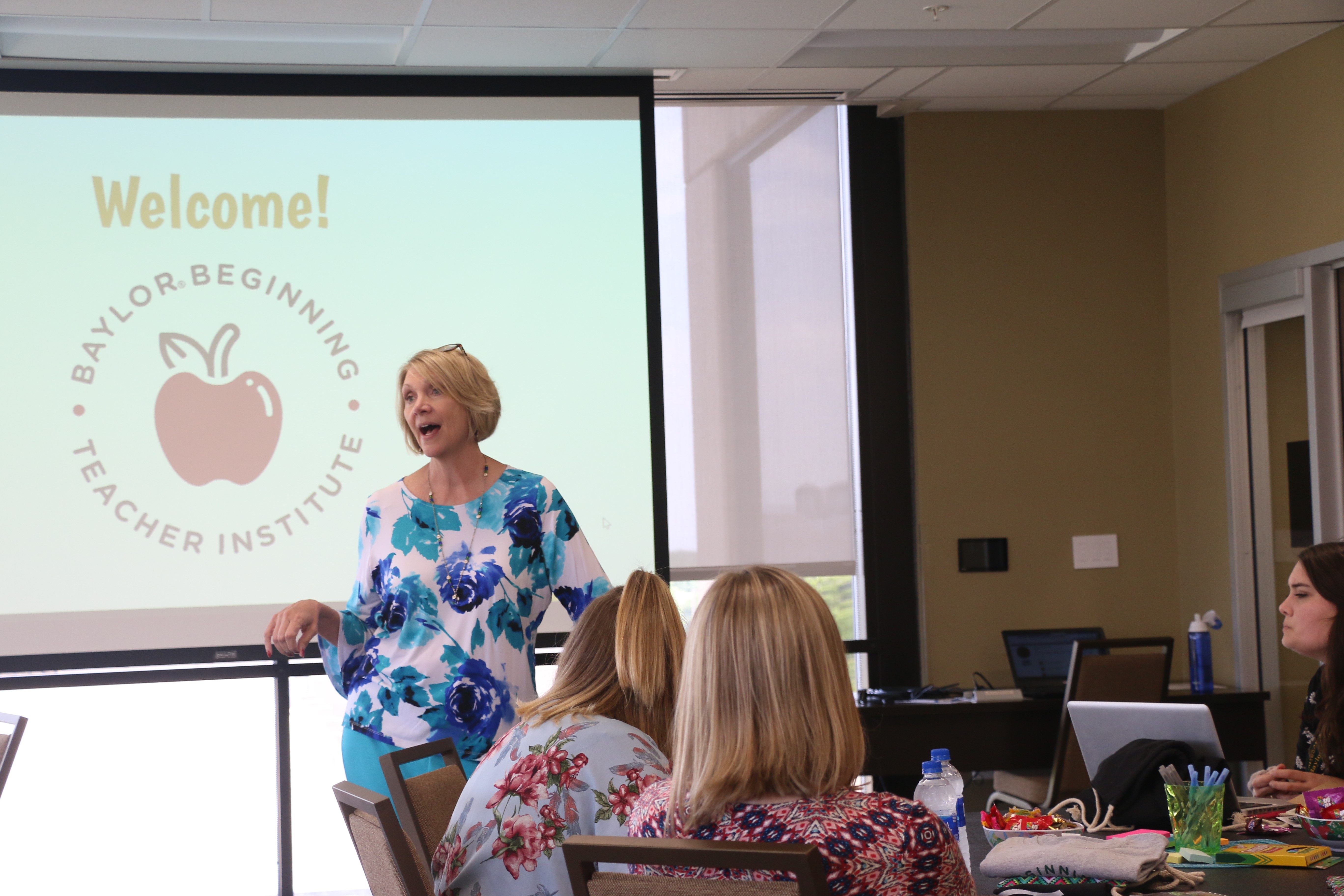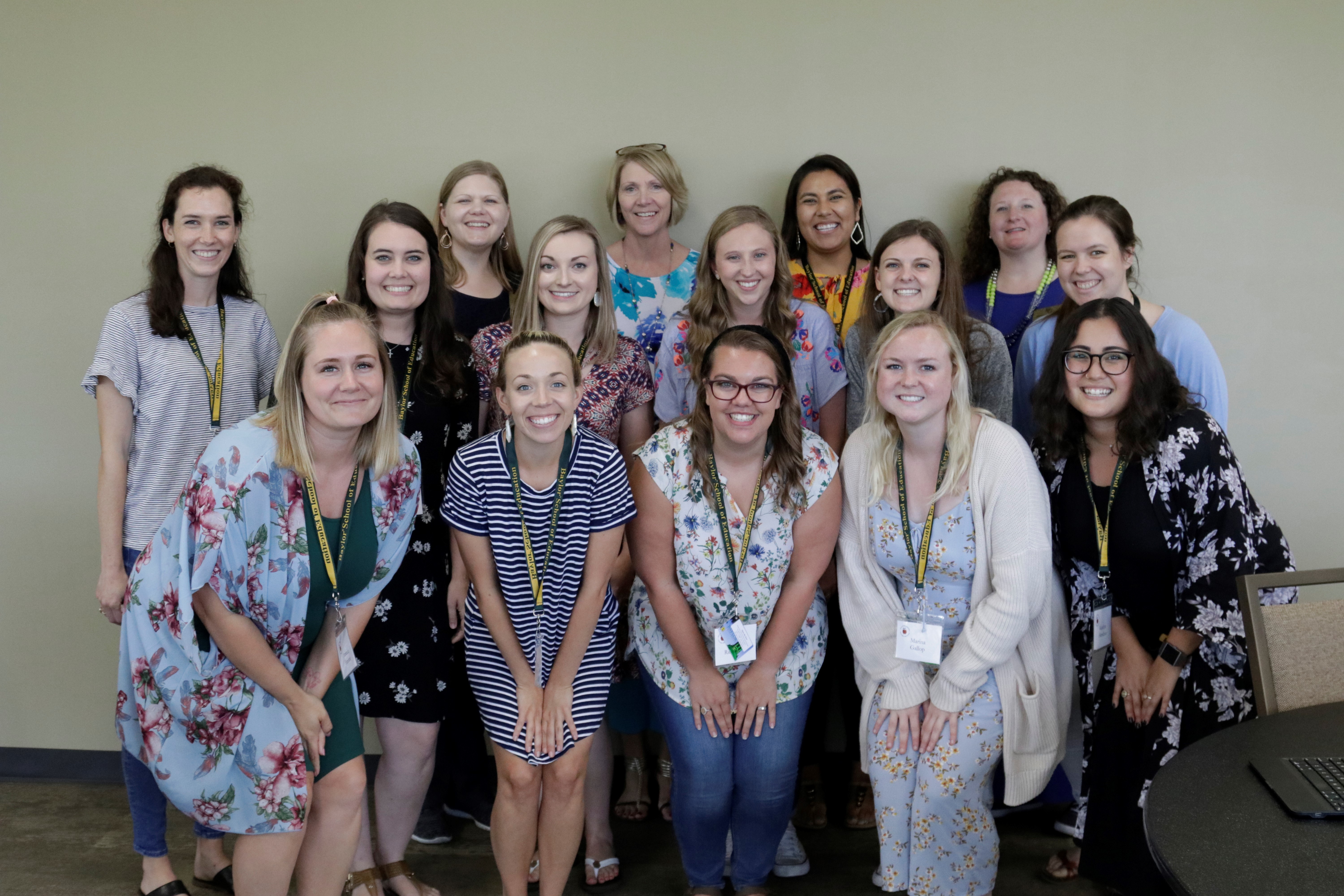Baylor’s Beginning Teacher Institute Provides Professional Development, Creates Community


Media Contact: Tonya B. Hudson, Baylor University Media and Public Relations, 254-710-4656
Follow us on Twitter: @BaylorUMedia
by Brooke Hill, student newswriter, Baylor University Media & Public Relations
WACO, Texas (July 23, 2019) — Second-grade teacher Katelyn Hamilton, B.S.Ed. ‘18, M.S.Ed. ‘19, described her first year of teaching as a “complete whirlwind.”
“When you work with kids there are no dull moments, and being a new teacher is like dodging 100 baseballs at once while being blindfolded,” Hamilton said.
“Whether it’s avoiding someone’s puke or bathroom accident, comforting a crying student during your class yearbook photo or chasing a rogue child around the school in your favorite pair of shoes, each day is an adventure. But for every challenging moment I encountered, it was all worth it for the spontaneous hugs, the strange knock-knock jokes, the handmade cards and the ‘aha’ moments that all teachers love. For every hard moment, there was a moment of clarity,” she said.
The inaugural Beginning Teacher Institute at Baylor University‘s School of Education brought together early-career teachers like Hamilton to provide development and training while connecting them with other educators and friends who are in the beginning stages of their careers.
This year’s institute was open to elementary teachers who graduated from Baylor general education, special education or gifted-and-talented programs in 2016, 2017 or 2018, with a plan to expand to secondary education graduates in 2020.
Baylor doctoral candidate Tracy Harper said the idea came about after she saw a similar institute at her alma mater, Abilene Christian University, and approached leadership with a request to create one at Baylor.
Supporting teachers, researching retention
“Our primary goals are to make sure that our young teachers are supported in their early years of teaching and to get feedback on what we can do in the undergraduate program to make the transition to their own classrooms easier,” Harper said. “We’re also researching teacher retention and resiliency to get more information about how we can help teachers stay in the field once they leave our program.”
Hamilton said the programs in the Baylor School of Education stand out from others because undergraduates are in an actual school classroom for all four years of their undergraduate preparation, which makes for an easier transition into their own classroom following graduation. Faculty-guided field experiences allow education students to be active in classroom settings as early as their first semester.
“I can’t even imagine going into my first year without having my student teaching to back me up,” Hamilton said. “It is incredibly challenging to learn on the job about testing, data collection, school procedures and drills without also having to worry about every other aspect of your classroom. I am thankful to have the opportunity to view other classrooms and various grade levels in their learning process.”
Because teaching is hard work, Harper said early-career teachers are at a high risk for leaving the field.
“Keeping teachers in the classroom requires resiliency to navigate the demands of the job,” Harper said. “We think that a network of support is just as important as professional learning in helping teachers feel successful in their classroom. We want the institute to provide relevant knowledge for these teachers, but also to create a space for ongoing relationships between Baylor grads, their peers and our professors.”
“Joyful reunion”
That is exactly what the weekend back on campus did for Hamilton and her peers. The institute was free for attendees, who stayed in residence halls and ate at the same dining halls as they did during their time as Baylor undergraduates.
“Being a working professional is so strikingly different than being in college, so it felt great to dip my toe back into college life, like eating at the dining hall and being back in the School of Education,” Hamilton said.
First-grade teacher Morgan Richardson, B.S.Ed. ‘18, said the whole weekend felt like one joyful reunion.
“The moment I stepped out of the car I was greeted by friends from my years in the School of Education,” Richardson said. “As we walked around campus, we reminisced about everything from our dorm experiences with loved roommates, to which dining halls we spent the most time at, to funny moments in our Baylor field experiences.”
Friday’s schedule was designed for the teachers to connect and share stories (some over a special Dr Pepper Hour), while Saturday was filled with development sessions. Teachers could choose to attend sessions on such topics as social issues, science, technology, engineering and math (STEM), creativity and new Texas Essential Knowledge & Skills (TEKS).
“I left with new ideas for how to bring more creativity into the classroom, feeling more confident about the new English language arts and reading (ELAR) TEKS, ready to implement STEM into the curriculum and care for a new group of students in the fall,” Richardson said.
A special aspect of the weekend for Richardson was seeing the professors who guided her through her undergraduate experience.
“Throughout the weekend we were surprised with warm greetings from our Baylor professors from various education courses,” Richardson said. “Dr. Barbara Purdum-Cassidy (coordinator of the elementary education program) even remembered where we each sat during one of her courses years ago.
Sharing experiences
Her favorite part of the weekend was being with other educators who also just started their first years of teaching.
“We shared stories, struggles, ideas and bits of encouragement,” Richardson said. “We all had Baylor in common, but we learned about vast differences of everyone’s individual experience. We came together in a way we hadn’t been able to yet as undergrads. Baylor was our home for so long, and we didn’t want to lose it. For most of us, this was the only time we had been on campus besides Homecoming, and we loved having an excuse to come back.”
The Baylor School of Education’s nationally recognized program of teacher preparation uses a model of deep clinical training, coupled with expert faculty guidance, that prepares educators to impact the world. The School’s robust graduate program also offers options at the master’s, specialist and doctoral levels for aspiring teachers, clinicians, K-12 and higher education leaders, sports administrators, and researchers and faculty members. In addition, unique opportunities in study abroad on three continents take students into schools to provide first-hand experience of comparative educational settings across national systems.
For more information, visit the Baylor School of Education at www.baylor.edu/soe.
ABOUT BAYLOR UNIVERSITY
Baylor University is a private Christian University and a nationally ranked research institution. The University provides a vibrant campus community for more than 17,000 students by blending interdisciplinary research with an international reputation for educational excellence and a faculty commitment to teaching and scholarship. Chartered in 1845 by the Republic of Texas through the efforts of Baptist pioneers, Baylor is the oldest continually operating University in Texas. Located in Waco, Baylor welcomes students from all 50 states and more than 90 countries to study a broad range of degrees among its 12 nationally recognized academic divisions.
ABOUT BAYLOR SCHOOL OF EDUCATION
For more than 100 years Baylor educators have carried the mission and practices of the School of Education to classrooms and beyond as teachers, superintendents, psychologists, health education professionals, academics/scholars and more. With more than 50 full-time faculty members, the school’s growing research portfolio complements its long-standing commitment to excellence in teaching and student mentoring. Baylor’s undergraduate program in teacher education has earned national distinction for innovative partnerships with local schools that provide future teachers deep clinical preparation, while graduate programs culminating in both the Ed.D. and Ph.D. prepare outstanding leaders, teachers and clinicians through an intentional blend of theory and practice. Visit www.baylor.edu/soe to learn more.